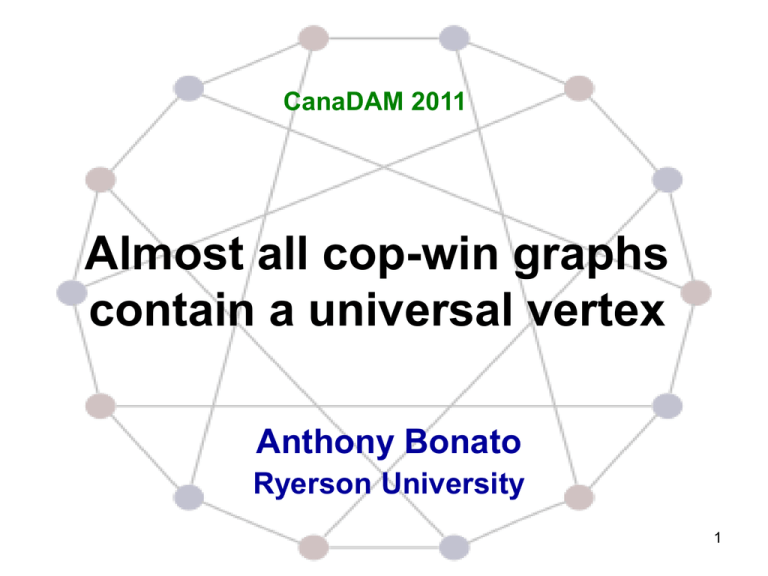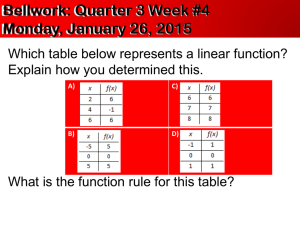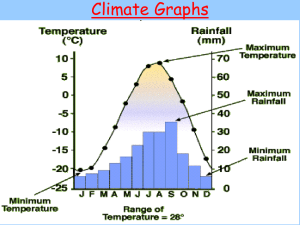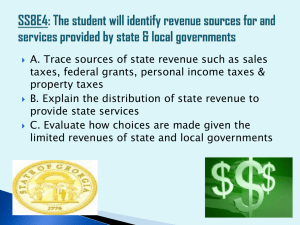Random cop-win graphs
advertisement

CanaDAM 2011
Almost all cop-win graphs
contain a universal vertex
Anthony Bonato
Ryerson University
1
Cop number of a graph
• the cop number of a graph, written c(G), is
an elusive graph parameter
– few connections to other graph parameters
– hard to compute
– hard to find bounds
– structure of k-cop-win graphs with k > 1 is not
well understood
Random cop-win graphs
Anthony Bonato
2
Cops and Robbers
• played on reflexive graphs G
• two players Cops C and robber R play at alternate
time-steps (cops first) with perfect information
• players move to vertices along edges; allowed to
moved to neighbors or pass
• cops try to capture (i.e. land on) the robber, while
robber tries to evade capture
• minimum number of cops needed to capture the
robber is the cop number c(G)
– well-defined as c(G) ≤ γ(G)
Random cop-win graphs
Anthony Bonato
3
Fast facts about cop number
• (Aigner, Fromme, 84) introduced parameter
– G planar, then c(G) ≤ 3
• (Berrarducci, Intrigila, 93), (Hahn, MacGillivray,06),
(B, Chiniforooshan,10):
“c(G) ≤ s?” s fixed: running time O(n2s+3), n = |V(G)|
• (Fomin, Golovach, Kratochvíl, Nisse, Suchan, 08):
if s not fixed, then computing the cop number is NP-hard
• (Shroeder,01) G genus g, then c(G) ≤ ⌊ 3g/2 ⌋+3
• (Joret, Kamiński, Theis, 09) c(G) ≤ tw(G)/2
Random cop-win graphs
Anthony Bonato
4
Meyniel’s Conjecture
• c(n) = maximum cop number of a connected
graph of order n
• Meyniel Conjecture: c(n) = O(n1/2).
Random cop-win graphs
Anthony Bonato
5
State-of-the-art
• (Lu, Peng, 09+) proved that
n
c(n) O
(1 o (1 ))
2
log 2 n
• independently proved by (Scott, Sudakov,10+),
and (Frieze, Krivelevich, Loh, 10+)
• even proving
c(n) = O(n1-ε)
for some ε > 0 is open
Random cop-win graphs
Anthony Bonato
6
Cop-win case
• consider the case when one cop has a
winning strategy
– cop-win graphs
• introduced by (Nowakowski, Winkler, 83),
(Quilliot, 78)
– cliques, universal vertices
– trees
– chordal graphs
Random cop-win graphs
Anthony Bonato
7
Characterization
• node u is a corner if there is a v such that N[v] contains
N[u]
– v is the parent; u is the child
• a graph is dismantlable if we can iteratively delete
corners until there is only one vertex
Theorem (Nowakowski, Winkler 83; Quilliot, 78)
A graph is cop-win if and only if it is dismantlable.
idea: cop-win graphs always have corners; retract corner
and play shadow strategy;
- dismantlable graphs are cop-win by induction
Random cop-win graphs
Anthony Bonato
8
Dismantlable graphs
Random cop-win graphs
Anthony Bonato
9
Dismantlable graphs
• unique corner!
• part of an infinite family that maximizes capture time
(Bonato, Hahn, Golovach, Kratochvíl,09)
Random cop-win graphs
Anthony Bonato
10
Cop-win orderings
• a permutation v1, v2, … , vn of V(G) is a
cop-win ordering if there exist vertices
w1, w2, …, wn such that for all i, wi is the parent
of vi in the subgraph induced V(G) \ {vj : j < i}.
– a cop-win ordering
dismantlability
5
1
3
2
4
Random cop-win graphs
Anthony Bonato
11
Cop-win Strategy (Clarke, Nowakowski, 2001)
• V(G) = [n] a cop-win ordering
• G1 = G, i > 1, Gi: subgraph induced by deleting 1, …, i-1
• fi: Gi → Gi+1 retraction mapping i to a fixed one of its parents
• Fi = fi-1 ○… ○ f2 ○ f1
– a homomorphism
• idea: robber on u, think of Fi(u) shadow of robber
– cop moves to capture shadow
– works as the Fi are homomorphisms
• results in a capture in at most n moves of cop
Random cop-win graphs
Anthony Bonato
12
Random graphs G(n,p)
(Erdős, Rényi, 63)
• n a positive integer, p = p(n) a real number in
(0,1)
• G(n,p): probability space on graphs with nodes
{1,…,n}, two nodes joined independently and
with probability p
1
2
3
4
5
Random cop-win graphs
Anthony Bonato
13
Typical cop-win graphs
• what is a random cop-win graph?
• G(n,1/2) and condition on being cop-win
• probability of choosing a cop-win graph on the
uniform space of labeled graphs of ordered n
Random cop-win graphs
Anthony Bonato
14
Cop number of G(n,1/2)
• (B,Hahn, Wang, 07), (B,Prałat, Wang,09)
A.a.s.
c(G(n,1/2)) = (1+o(1))log2n.
-matches the domination number
Random cop-win graphs
Anthony Bonato
15
Universal vertices
• P(cop-win) ≥ P(universal)
= n2-n+1 – O(n22-2n+3)
= (1+o(1))n2-n+1
• …this is in fact the correct answer!
Random cop-win graphs
Anthony Bonato
16
Main result
Theorem (B,Kemkes, Prałat,11+)
In G(n,1/2),
P(cop-win) = (1+o(1))n2-n+1
Random cop-win graphs
Anthony Bonato
17
Corollaries
Corollary (BKP,11+)
The number of labeled cop-win graphs is
Random cop-win graphs
Anthony Bonato
18
Corollaries
Un = number of labeled graphs with a universal
vertex
Cn = number of labeled cop-win graphs
Corollary (BKP,11+)
lim
n
Un
1.
Cn
That is, almost all cop-win graphs contain a
universal vertex.
Random cop-win graphs
Anthony Bonato
19
Strategy of proof
• probability of being cop-win and not having
a universal vertex is very small
1. P(cop-win + ∆ ≤ n – 3) ≤ 2-(1+ε)n
2. P(cop-win + ∆ = n – 2) = 2-(3-log23)n+o(n)
Random cop-win graphs
Anthony Bonato
20
P(cop-win + ∆ ≤ n – 3) ≤ 2-(1+ε)n
• consider cases based on number of parents:
a. there is a cop-win ordering whose vertices in their initial
segments of length 0.05n have more than 17 parents.
b. there is a cop-win ordering whose vertices in their initial
segments of length 0.05n have at most 17 parents, each
of which has co-degree more than n2/3.
c. there is a cop-win ordering whose initial segments of
length 0.05n have between 2 and 17 parents, and at least
one parent has co-degree at most n2/3.
d. there exists a vertex w with co-degree between 2 and n2/3,
such that wi = w for i ≤ 0.05n.
Random cop-win graphs
Anthony Bonato
21
P(cop-win + ∆ = n – 2) ≤ 2-(3-log 3)n+o(n)
2
Sketch of proof: Using (1), we obtain that there is an ε > 0
such that
P(cop-win) ≤ P(cop-win and ∆ ≤ n-3) + P(∆ ≥ n-2)
≤ 2-(1+ε)n + n22-n+1
≤ 2-n+o(n) (*)
• if ∆ = n-2, then G has a vertex w of degree n-2, a unique
vertex v not adjacent to w.
– let A be the vertices not adjacent to v (and adjacent to w)
– let B be the vertices adjacent to v (and also to w)
• Claim: The subgraph induced by B is cop-win.
Random cop-win graphs
Anthony Bonato
22
w
A
x
B
v
Random cop-win graphs
Anthony Bonato
23
Proof continued
• n choices for w; n-1 for v
n2
•
i0
n
i
2
choices for A
• if |A| = i, then using (*), probability that B is cop-win is at
most 2-n+2+i+o(n)
Random cop-win graphs
Anthony Bonato
24
Problems
• do almost all k-cop-win graphs contain a dominating set of
order k?
– would imply that the number of labeled k-cop-win graphs
of order n is
– difficulty: no simple elimination ordering for k > 1
(Clarke, MacGillivray,09+)
• characterizing cop-win planar graphs
• (Clarke, Fitzpatrick, Hill, Nowakowski,10): classify the copwin graphs which have cop number 2 after a vertex is
deleted
Random cop-win graphs
Anthony Bonato
25
• preprints, reprints, contact:
Google: “Anthony Bonato”
Random cop-win graphs
Anthony Bonato
26
Random cop-win graphs
Anthony Bonato
27









